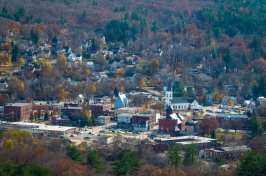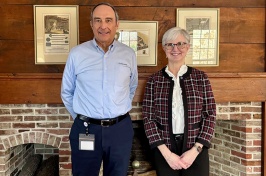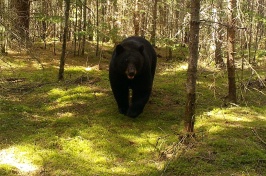NH Agricultural Experiment Station
Electromagnetic Therapy Potential Tool for Improving Dairy Herd Health
UNH partners with MagnaWave to explore pulsed electromagnetic therapy for dairy cows, showing promise for mastitis treatment and udder health improvement. Read More-
03/03/25
Living Labs: How Experimental Forests Offer Insights into Small Mammal Population Dynamics
UNH study reveals how small mammals adapt reproduction to forest seed cycles, influencing seed dispersal, tree regeneration, and forest ecosystem... -
02/03/25
Could Manure Help Cool-Climate Farmers Get Closer to Year-Round Farming?
UNH scientists innovate manure-powered systems to heat greenhouses, extending growing seasons for small farms while boosting sustainability and... -
01/03/25
In Consideration of New Approaches to Wildlife Research
UNH research reveals gaps in wildlife studies, calling for a balanced focus on smaller species to guide conservation efforts and prevent biodiversity... -
12/16/24
Phytoplankton Monitoring in Gulf of Maine as a Signal of Climate Change Impacts
UNH researchers study phytoplankton dynamics in the Gulf of Maine to understand climate change impacts, marine biodiversity shifts, and sustainable...
Recent Stories
-
09/06/24 - Estrogen in Clover?Researchers at UNH find drought increases phytoestrogen levels in red clover, impacting dairy cows’ health. Kura clover shows promise as a resilient forage alternative. Read More
-
08/14/24 - Innovations in Dairy: UNH Researchers Drive Advancements in Dairy FarmingDiscover how innovative research at New Hampshire Agricultural Experiment Station is transforming dairy farming with sustainable practices, healthier calves, and methane-reducing... Read More
-
08/07/24 - Marine Heatwaves’ Impacts on Marine OrganismsNew UNH research develops a biological approach to understanding marine heatwave effects, offering detailed insights into the impacts on marine life and mitigation strategies. Read More
-
07/25/24 - Optimizing Lumpfish RearingUNH research shows that adjusting light and density in lumpfish hatcheries reduces aggression, enhancing their role in controlling sea lice in salmon farms. Read More
-
07/15/24 - Using Duckweed as a Green ManureDiscover UNH research on using duckweed to cleanse water and serve as green manure for sustainable farming. Read More
-
07/02/24 - Targeted Home Systems to Remove PFAS More Cost-Effective Than System-Wide SolutionsHouseholds on public water systems are willing to pay an average of $13.07 a month, or $156.84 annually, on their monthly bills to protect themselves from PFAS — potentially... Read More
-
06/26/24 - UNH Receives USDA Grant to Boost Climate-Resilient Farming PracticesUNH receives USDA grant to explore crop row orientation and cover cropping strategies, aiming to boost climate-resilient farming practices and enhance soil health. Read More
-
06/19/24 - Microplastics in EstuariesEstuaries in New England are crucial for wildlife and aquaculture, but microplastics pose a growing threat. UNH researchers are studying microplastic movement and accumulation to... Read More
-
06/17/24 - Aquatic Plants Could Help Reduce Water PollutionTiny aquatic plants called duckweed and their microbes could be engineered to cleanse chemicals from runoff water. Anna O'Brien's research at UNH aims to improve stormwater... Read More
-
06/13/24 - COLSA Faculty Spotlight: Bonnie BrownDiscover why COLSA Professor Bonnie Brown chose New Hampshire, how Richard Dreyfuss inspired her career, and the five must-have items in her fridge. Read More






























































